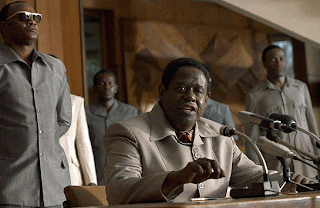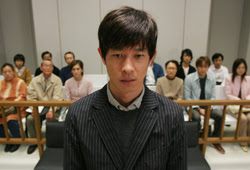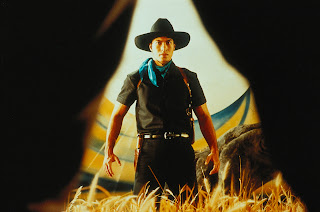I'd like to call your attention to A.O. Scott's excellent Sunday New York Times piece on the waning profile of foreign language films in the U.S. Scott, along with his colleague Manohla Dargis, has over the past few years become essential reading for me, offering consistently witty, intelligent, and often quite brilliant (for example, Dargis' recent piece on Inland Empire) commentary, which is quite a rarity these days in the landscape of mainstream film reviewing.
Scott's piece is a quite sobering and thorough assessment of the low box office returns and increasing marginalization of foreign-language releases. I can certainly relate to the often lonely situation of having seen a great film from Korea, Japan, China, Indonesia, Roumania, Mali, or wherever, and being met with blank stares when I mention them. Or even worse, not even bothering to bring them up because of the impossibility of having any sort of meaningful discussion about them. However, I'm not quite as pessimistic about the situation as Scott is, which perhaps has to do with the fact that I am of a younger generation that wasn't around for the halcyon cinephilic days of the 60's and 70's. The idea of cinema as primarily a theatergoing experience is very quickly disappearing. And while definitely something is being lost, and obviously a beautiful new celluloid print of a great classic work is to your video IPod as Nobu is to McDonald's, there are some definite gains as well. I enjoy the fact that I can enjoy the latest works of say, Johnnie To, Kim Ki-duk, E J-yong, Peter Chan, or classics such as the lovely Naruse box set from Masters of Cinema without being subject to the whims, fashions and financial pressures of distributors.
Film companies are starting to wake up to this changing cinema landscape, as Manohla Dargis reports in her piece in the same issue. Films such as Hou Hsiao-hsien's Three Times have at least the potential to reach far more people through cable than any small distributor. And perhaps in the end, all of this will come out to a net positive, as audiences become more savvy to the endless variety of world cinema, in all forms, that is available around them, and is as close to them as their laptop, television set, or local film festival. One can only hope.
Monday, January 22, 2007
Saturday, January 20, 2007
In Darkest Africa

Earlier today, I caught up with The Last King of Scotland, Kevin Macdonald's adaptation of Giles Foden's novel that is centered around the brutal Ugandan dictator Idi Amin. It screened at the Walter Reade Theater as part of a tribute to Forest Whitaker, who gives a magisterial performance as the wily, charming, and evil Amin, and shows us in a chilling manner how these qualities can coexist in the same man. Whitaker, who recently took home a Golden Globe for his performance, is more than deserving of the fulsome praise he has received so far. Ever since his breakout role in Scorsese's The Color of Money, he has quietly become one of the world's finest actors. From his first scene in the film, in which he pumps up a massive crowd at a rally ("You can oh yeah!"), Whitaker is an electric screen presence as seductive to us in the audience as he is to the feckless Scottish do-gooder he takes under his wing, played by James McAvoy.
So as I say, Whitaker is as brilliant as everyone says. It's what surrounds him that I find highly problematic. Amin is not the main character of either the film or the novel, but instead the film's protagonist, the one we as audience members are invited to sympathize with, is Nicholas Garrigan, a naive, impulsive, and quite stupid Scottish med-school graduate who, looking for a place to practice medicine, picks Uganda at random by spinning a globe and pointing a finger (after first landing on Canada and quickly spinning again). Garrigan, who is picked by Amin to be his personal physician, is apparently a composite character made up of a number of white advisors who were complicit in keeping Amin in power, even as he systematically murdered his own people by the thousands.
However, this insistence of seeing Amin and the events in Uganda through the eyes of this white observer, which is a typical strategy of films that use Africa as its subject, Blood Diamond being the most recent example, serves to render hazy the origins and the specifics of the colonialist legacy and tribal conflicts that conspire to create a figure such as Amin. We walk away from the film no more enlightened about Amin or Uganda than we were when we went in. Yes, Amin was a bad, bad guy, but was there any doubt of that? Is that all Macdonald's film has to say?
Also, I personally find it rather insulting that so many films about Africa (and this is true of other non-Western cultures depicted in films) seem to feel that the audience requires a surrogate to translate the events for us, as if everyone in the audience is white (which is certainly not true in my case). Through the eyes of this usually horrified observer, we are invited to tsk-tsk and say, "isn't that horrible?" And then the credits roll, we throw away our popcorn, and we are no longer required to reflect or do our own thinking, since the filmmakers have presumably already done that for us.
And using such a self-absorbed, thoughtless, and purposely blind character, who makes incredibly stupid moves such as sleeping with one of the wives of his murderous dictator boss (!), truly puts the white surrogate strategy to its ultimate test. In the film's second half, Amin becomes more and more relegated to the background, as the bills come due on Garrigan's dumb mistakes. The film becomes increasingly overheated as the hellish consequences of Amin's desperation and paranoia come to full fruition, and the camerawork of Anthony Dod Mantle (the great Dogma cinematographer) illustrates a Dantean maelstrom, as the bodies (often hacked and mutilated) pile up.
But all this sound and fury generates much more heat than it does light, and in the end, Whitaker's masterful work is put in the service of yet another simplistic, despairing, and unenlightening depiction of Africa. Correctives to this are sorely needed, and luckily there are quite a few available. I refer you to the works of, for example, Senegal's Ousmane Sembene, or Mali's great filmmaker Abderrahmane Sissako, whose intellectually and emotionally satisfying Bamako, about the impact of the IMF and the World Bank on Africa, opens at the Film Forum on February 14. I saw this film last year at the New York Film Festival, and Sissako's film deals with the issue of Africa's misery in a complex, rigorous, and formally inventive way, as opposed to Macdonald's film which doesn't even attempt such a task.
Also, if you want to see the real Idi Amin on film, and you're in the New York area, then make your way to the Museum of the Moving Image, where on February 9 and 10, Barbet Schroeder's celebrated documentary General Idi Amin Dada will screen as part of the New York Film Critics Circle's series "Critics Choice: Great Documentaries." More info can be found here.
So as I say, Whitaker is as brilliant as everyone says. It's what surrounds him that I find highly problematic. Amin is not the main character of either the film or the novel, but instead the film's protagonist, the one we as audience members are invited to sympathize with, is Nicholas Garrigan, a naive, impulsive, and quite stupid Scottish med-school graduate who, looking for a place to practice medicine, picks Uganda at random by spinning a globe and pointing a finger (after first landing on Canada and quickly spinning again). Garrigan, who is picked by Amin to be his personal physician, is apparently a composite character made up of a number of white advisors who were complicit in keeping Amin in power, even as he systematically murdered his own people by the thousands.
However, this insistence of seeing Amin and the events in Uganda through the eyes of this white observer, which is a typical strategy of films that use Africa as its subject, Blood Diamond being the most recent example, serves to render hazy the origins and the specifics of the colonialist legacy and tribal conflicts that conspire to create a figure such as Amin. We walk away from the film no more enlightened about Amin or Uganda than we were when we went in. Yes, Amin was a bad, bad guy, but was there any doubt of that? Is that all Macdonald's film has to say?
Also, I personally find it rather insulting that so many films about Africa (and this is true of other non-Western cultures depicted in films) seem to feel that the audience requires a surrogate to translate the events for us, as if everyone in the audience is white (which is certainly not true in my case). Through the eyes of this usually horrified observer, we are invited to tsk-tsk and say, "isn't that horrible?" And then the credits roll, we throw away our popcorn, and we are no longer required to reflect or do our own thinking, since the filmmakers have presumably already done that for us.
And using such a self-absorbed, thoughtless, and purposely blind character, who makes incredibly stupid moves such as sleeping with one of the wives of his murderous dictator boss (!), truly puts the white surrogate strategy to its ultimate test. In the film's second half, Amin becomes more and more relegated to the background, as the bills come due on Garrigan's dumb mistakes. The film becomes increasingly overheated as the hellish consequences of Amin's desperation and paranoia come to full fruition, and the camerawork of Anthony Dod Mantle (the great Dogma cinematographer) illustrates a Dantean maelstrom, as the bodies (often hacked and mutilated) pile up.
But all this sound and fury generates much more heat than it does light, and in the end, Whitaker's masterful work is put in the service of yet another simplistic, despairing, and unenlightening depiction of Africa. Correctives to this are sorely needed, and luckily there are quite a few available. I refer you to the works of, for example, Senegal's Ousmane Sembene, or Mali's great filmmaker Abderrahmane Sissako, whose intellectually and emotionally satisfying Bamako, about the impact of the IMF and the World Bank on Africa, opens at the Film Forum on February 14. I saw this film last year at the New York Film Festival, and Sissako's film deals with the issue of Africa's misery in a complex, rigorous, and formally inventive way, as opposed to Macdonald's film which doesn't even attempt such a task.
Also, if you want to see the real Idi Amin on film, and you're in the New York area, then make your way to the Museum of the Moving Image, where on February 9 and 10, Barbet Schroeder's celebrated documentary General Idi Amin Dada will screen as part of the New York Film Critics Circle's series "Critics Choice: Great Documentaries." More info can be found here.
Last King of Scotland trailer:
The Godfather of "The Godfather": Alberto Lattuada's "Mafioso" Opens in NYC

One of the things that annoy me about many of the film reviews I read and see on TV at this time of year is the constant voicing of the conventional wisdom that January and February are the doldrums of the movie year, and there's nothing worth seeing until the summer and fall. This sort of propaganda perpetuated by many mainstream film reviewers only serves to further expose their eagerness to play into the hands of marketers and PR agents, contributing to the sorry state of discourse on movies in our major media outlets. While it is true that many unambitious, bottom-feeder studio releases are released at this time (often without being screened for critics) the fact is, especially if you live in a major city, that there are always films worth seeing if you're willing to put in a little effort to search them out.
Case in point: Alberto Lattuada's brilliant and entertaining 1962 comedy/thriller Mafioso, opening in New York this weekend at the Lincoln Plaza and the Angelika. Lattuada was a major Italian director who made films from the 40's through the 80's, and has been overshadowed by his more celebrated peers, including Federico Fellini, with whom Lattuada co-directed Variety Lights. However, on the evidence of Mafioso, Lattuada is a figure worthy of rediscovery, and this film is a great introduction to its director. Mafioso is a clear antecedent to The Godfather, but it is no mere historical curio, and has great charms and interest on its own terms.
The great character actor Alberto Sordi is riveting as an auto factory foreman who takes his wife and children to his hometown in Sicily, where he reunites with his large and hilariously expressive family, shrugs off his northern refinement, and reverts to the accent and old acquaintances of his southern life. A darker side emerges, and the film shifts from its initial comic tone as he learns he has to fulfill certain family-based obligations. In deference to the wishes of Rialto Pictures, the film's distributor, I won't reveal more than that. Just know that if you are in New York (it opens next week in LA, and in more cities to come), it most likely is the most entertaining film out there now, and that this is the year's first major re-discovery, of which I hope there is many more to come.
Links:
My Meniscus Magazine review
A.O. Scott (New York Times)
Philip Lopate (Film Comment)
Donato Totaro on the films of Alberto Lattuada (Offscreen)
Mafioso trailer:
Tuesday, January 16, 2007
Growing Pains

One of my favorite Korean actresses is Moon Geun-yeong, an incredibly cute and engaging young woman I first encountered in Kim Jee-woon's creepy tour-de-force A Tale of Two Sisters, but who gained her greatest popularity in light, romantic comedies such as My Little Bride and Innocent Steps. For me, Moon possessed an irresistible charisma that almost single-handedly redeemed substandard and hackneyed plots, which was certainly the case with Innocent Steps. As Moon turns 20, and pursues her college studies, her career unfortunately seems to have hit a rough patch. Her latest film, Love Me Not, in which she essayed a more serious role as a blind heiress, was a resounding flop upon its release this past November. A television commercial she made shortly after the film's release in an abrupt attempt to sex up her image (see below) also encountered negative reaction, even opening her up to charges of plagiarism, both of her dance moves and the song she sang in the commercial. Moon recently gave an interview to Reuters in which she seems to express frustration with the constant scrutiny of her every move. (Note on the Reuters piece: Moon plays a Korean-Chinese woman in Innocent Steps, not a North Korean as stated in the article.)
.jpg)
My unsolicited career advice to Ms. Moon is simply this: material, material, material. Korea is home to some of the world's most brilliant and provocative writers and directors. Hook up with one of them. For example, I would love to see how someone like Hong Sang-soo would use you. Lee Myung-se, Park Chan-wook, Bong Joon-ho, Lee Chang-dong, Kim Ki-duk (now that would be a pairing!), E J-yong ... the list goes on and on. Another good idea would to be to work with a female director, since there are so few of them, and lending your star power to one of their projects would be a great advancement. Directors such as Jeong Jae-eun, Byun Young-joo, or Yim Soon-rye would be a nice match for you. Get on the phone with your agent or manager and demand material that is worthy of your gifts.
You can thank me later.
An Acceptance Speech for the Ages

The only highlight of this year's particularly sleep-inducing Golden Globes ceremony was Sacha Baron Cohen's richly deserved win for Borat: Cultural Learnings of America For Make Benefit Glorious Nation of Kazakhstan (one of the greatest titles of cinematic history; it's almost a sacrilege to truncate it), one of last year's very best films. His acceptance speech was a thing of beauty, from which I will quote at length:
"I just want to say this movie was a life-changing experience. I saw some amazing, beautiful, invigorating parts of America, but I saw some dark parts of America, an ugly side of America that rarely sees the light of day. I refer, of course, to the anus and testicles of my co-star, Ken Davitian. Ken, when I was in that scene, and I stared down and saw your two wrinkled Golden Globes on my chin, I thought to myself: I better win a bloody award for this. And then, when my 300-pound co-star decided to sit on my face and squeeze the oxygen from my lungs, I was faced with a choice: death, or to breathe in the air that had been trapped in a small pocket between his buttocks for thirty years. Kenneth, if it was not for that rancid bubble, I would not be here today."
"...And thank you to every American who has not sued me so far."
Ken Davitian's priceless reaction shots were the cherry on top.
Oscar? Are you listening?
Monday, January 15, 2007
A.I. Bezzerides, 1908-2007 R.I.P.
 One of the great Hollywood screenwriters, of some of the best films by such auteurist gods as Nicholas Ray (They Drive By Night, On Dangerous Ground), Jules Dassin (Thieves' Highway), and Robert Aldrich, whose greatest work provides the image you see above: Kiss Me Deadly (1955), a major formative film experience for me. This film took the term noir more literally than any other I can think of. The backward credits ("Deadly Kiss Me"); the off-the-wall apocalyptic plot; Ralph Meeker's brutal cynicism; the oddball gallery of characters who made more of an impression in a minute of screen time than many others made in entire films; Cloris Leachman in a trench coat and nothing else ... they truly don't make 'em like that anymore.
One of the great Hollywood screenwriters, of some of the best films by such auteurist gods as Nicholas Ray (They Drive By Night, On Dangerous Ground), Jules Dassin (Thieves' Highway), and Robert Aldrich, whose greatest work provides the image you see above: Kiss Me Deadly (1955), a major formative film experience for me. This film took the term noir more literally than any other I can think of. The backward credits ("Deadly Kiss Me"); the off-the-wall apocalyptic plot; Ralph Meeker's brutal cynicism; the oddball gallery of characters who made more of an impression in a minute of screen time than many others made in entire films; Cloris Leachman in a trench coat and nothing else ... they truly don't make 'em like that anymore.Link:
Banquet of the Fearless Golden Flying Daggers
 An interesting piece today in Variety on the Chinese film industry's seemingly insatiable appetite for lavish period martial-arts themed extravaganzas such as Zhang Yimou's Curse of the Golden Flower (above), Feng Xiaogang's The Banquet (below), Ronny Yu's Fearless, and surely many more to come. Censorship is surely a culprit in this trend, since clearly fantasies of China's distant past are much safer for producers and investors, than say, films by such directors as Jia Zhangke who offer incisive, and often quite critical portraits of contemporary China. Jia's latest, the Venice Golden Lion-winner Still Life, found it impossible to get a screen in edgewise with Golden Flower dominating the market.
An interesting piece today in Variety on the Chinese film industry's seemingly insatiable appetite for lavish period martial-arts themed extravaganzas such as Zhang Yimou's Curse of the Golden Flower (above), Feng Xiaogang's The Banquet (below), Ronny Yu's Fearless, and surely many more to come. Censorship is surely a culprit in this trend, since clearly fantasies of China's distant past are much safer for producers and investors, than say, films by such directors as Jia Zhangke who offer incisive, and often quite critical portraits of contemporary China. Jia's latest, the Venice Golden Lion-winner Still Life, found it impossible to get a screen in edgewise with Golden Flower dominating the market.
Peter Ho-Sun Chan, a great director who made one of my favorite Hong Kong films, indeed, one of my favorite films period, Comrades: Almost a Love Story, as well as the haunting "Going Home," a section of the horror anthology Three, is also getting into the game, following up his musical Perhaps Love with This Violent Land, a $40 million epic to star Jet Li, Andy Lau, and Takeshi Kaneshiro.
These expensive epics, with more lushly decorated sets and star power than you could throw a million flying daggers at, certainly make for a financially robust industry, but at what cost? For me, the genre reached a nadir with Chen Kaige's laughable contribution The Promise. I do look forward to seeing both Golden Flower and The Banquet, and hope to post reviews of both these films here soon. But it is rather a shame that such filmmakers as Jia, Wang Xiaoshuai (whose Shanghai Dreams was one of the best films I saw last year), Zhu Wen (Seafood, South of the Clouds), and others who are responsible for one of the most creatively fertile periods in Chinese film history, can't get their films shown in their own country.
Saturday, January 13, 2007
Review: Masayuki Suo's "I Just Didn't Do It"
I Just Didn't Do It (Soredemo boku wa yattenai). 2006.
Written and directed by Masayuki Suo. Produced by Shoji Masui. Cinematography by Naoki Kayano. Edited by Junichi Kikuchi. Music by Yoshikazu Suo. Production design by Kyoko Heya. Released by Toho Company.
Cast: Ryo Kase (Teppei Kaneko), Koji Yakusho (Masayoshi Arakawa), Asaka Seto (Riko Sudo), Masako Motai (Toyoko Kaneko), Kohji Yamamoto (Tatsuo Saito).
.jpg) Perhaps it's way too early to start making a list for the best films of 2007, but one candidate has already presented itself, Masayuki Suo's extraordinary and chilling courtroom drama I Just Didn't Do It. Suo is best known in the West for Shall We Dance (1996), and in Japan as a director of light comedies. However, in his new film, Suo has emerged from an 11-year absence from filmmaking with this sobering and angry film. This film had its international premiere in New York on January 10 at Japan Society, with director Suo and actress Asaka Seto introducing the film. Based on a real courtroom case, Suo, with documentary-like meticulousness and dramatic intensity, has created a devastating critique of Japan's legal system.
Perhaps it's way too early to start making a list for the best films of 2007, but one candidate has already presented itself, Masayuki Suo's extraordinary and chilling courtroom drama I Just Didn't Do It. Suo is best known in the West for Shall We Dance (1996), and in Japan as a director of light comedies. However, in his new film, Suo has emerged from an 11-year absence from filmmaking with this sobering and angry film. This film had its international premiere in New York on January 10 at Japan Society, with director Suo and actress Asaka Seto introducing the film. Based on a real courtroom case, Suo, with documentary-like meticulousness and dramatic intensity, has created a devastating critique of Japan's legal system.
The film centers around the phenomenon of men groping women on Japan's notoriously packed commuter trains. Teppei (Ryo Kase, from Letters from Iwo Jima), a young man on his way to an internship, makes what turns out to be the fatal error of trying to free his jacket from a closed train door, and consequently finds himself accused of groping a 15-year old girl.
Suo's depiction of the routine sloppiness of investigations and lack of concern for basic rights is laid out in revealing detail. The detectives who question him rewrite his statements and pressure him to sign them. Everyone, including the public defender he initially meets, tells him to confess quickly so he can be let off with a fine. "It's like a traffic ticket," one detective tells him. At every point, Teppei resolutely refuses to confess to something he didn't do, believing (naively, it turns out) that he will be vindicated in court if the facts are presented.
.jpg)
Unfortunately, as the saying goes, it's not what you know but what you can prove, and this is relentlessly made clear in Suo's stark and riveting rendering of this case. Even a sympathetic judge and tenacious lawyers cannot protect Teppei from the legal noose that tightens inexorably around him.
Most of the film occurs in the courtroom, but Suo is extremely deft at maintaining a high level of dramatic intensity over its two and a half hour running time. The performances are excellent all around. Kase generates an incredible feeling of sympathy for his predicament with his controlled yet quite emotional portrayal. The characters of Teppei's lawyers, as played by Koji Yakusho and Asaka Seto, are well-drawn, and Yakusho's pragmatism and Seto's initial reluctance and suspicion come across particularly well.
Suo is as adept in visual terms as he is at narrative. Remarkably for a film mostly set in the courtroom, Suo lends varied visual textures to his depiction of the legal proceedings so that it never feels static, and we are always aware of what is at stake at each point. The film is appropriately outraged at the railroading of his protagonist, but it is never heavy-handed or overly agit-prop. There is also some sympathy and understanding for even the judges and prosecutors who are so eager to convict people quickly. There is much insight into how the Japanese legal system, as Suo sees it, is geared toward speedy convictions. Even more disturbing, there is little incentive to change this system, since it benefits both judges and lawyers. Judges are given promotions based on how quickly they can process cases and convict defendants, and lawyers cannot be blamed regardless of the outcome, since everything is so predetermined from the beginning.
Suo's film is a valuable reminder of how easily individual rights can be trampled by bureaucracy, judicial apathy, and collusion with state power, and not only in Japan. One needs only to look at the US and how terrorism suspects and so-called "enemy combatants" are routinely treated to know the truth of this.
I Just Didn't Do It will be released in Japan on January 20.
Links:
Official site (Japanese/English)
Mark Shilling (Japan Times) - site requires free registration
Christopher Campbell (The Reeler)
I Just Didn't Do It trailer:
Written and directed by Masayuki Suo. Produced by Shoji Masui. Cinematography by Naoki Kayano. Edited by Junichi Kikuchi. Music by Yoshikazu Suo. Production design by Kyoko Heya. Released by Toho Company.
Cast: Ryo Kase (Teppei Kaneko), Koji Yakusho (Masayoshi Arakawa), Asaka Seto (Riko Sudo), Masako Motai (Toyoko Kaneko), Kohji Yamamoto (Tatsuo Saito).
.jpg) Perhaps it's way too early to start making a list for the best films of 2007, but one candidate has already presented itself, Masayuki Suo's extraordinary and chilling courtroom drama I Just Didn't Do It. Suo is best known in the West for Shall We Dance (1996), and in Japan as a director of light comedies. However, in his new film, Suo has emerged from an 11-year absence from filmmaking with this sobering and angry film. This film had its international premiere in New York on January 10 at Japan Society, with director Suo and actress Asaka Seto introducing the film. Based on a real courtroom case, Suo, with documentary-like meticulousness and dramatic intensity, has created a devastating critique of Japan's legal system.
Perhaps it's way too early to start making a list for the best films of 2007, but one candidate has already presented itself, Masayuki Suo's extraordinary and chilling courtroom drama I Just Didn't Do It. Suo is best known in the West for Shall We Dance (1996), and in Japan as a director of light comedies. However, in his new film, Suo has emerged from an 11-year absence from filmmaking with this sobering and angry film. This film had its international premiere in New York on January 10 at Japan Society, with director Suo and actress Asaka Seto introducing the film. Based on a real courtroom case, Suo, with documentary-like meticulousness and dramatic intensity, has created a devastating critique of Japan's legal system.The film centers around the phenomenon of men groping women on Japan's notoriously packed commuter trains. Teppei (Ryo Kase, from Letters from Iwo Jima), a young man on his way to an internship, makes what turns out to be the fatal error of trying to free his jacket from a closed train door, and consequently finds himself accused of groping a 15-year old girl.
Suo's depiction of the routine sloppiness of investigations and lack of concern for basic rights is laid out in revealing detail. The detectives who question him rewrite his statements and pressure him to sign them. Everyone, including the public defender he initially meets, tells him to confess quickly so he can be let off with a fine. "It's like a traffic ticket," one detective tells him. At every point, Teppei resolutely refuses to confess to something he didn't do, believing (naively, it turns out) that he will be vindicated in court if the facts are presented.
.jpg)
Unfortunately, as the saying goes, it's not what you know but what you can prove, and this is relentlessly made clear in Suo's stark and riveting rendering of this case. Even a sympathetic judge and tenacious lawyers cannot protect Teppei from the legal noose that tightens inexorably around him.
Most of the film occurs in the courtroom, but Suo is extremely deft at maintaining a high level of dramatic intensity over its two and a half hour running time. The performances are excellent all around. Kase generates an incredible feeling of sympathy for his predicament with his controlled yet quite emotional portrayal. The characters of Teppei's lawyers, as played by Koji Yakusho and Asaka Seto, are well-drawn, and Yakusho's pragmatism and Seto's initial reluctance and suspicion come across particularly well.
Suo is as adept in visual terms as he is at narrative. Remarkably for a film mostly set in the courtroom, Suo lends varied visual textures to his depiction of the legal proceedings so that it never feels static, and we are always aware of what is at stake at each point. The film is appropriately outraged at the railroading of his protagonist, but it is never heavy-handed or overly agit-prop. There is also some sympathy and understanding for even the judges and prosecutors who are so eager to convict people quickly. There is much insight into how the Japanese legal system, as Suo sees it, is geared toward speedy convictions. Even more disturbing, there is little incentive to change this system, since it benefits both judges and lawyers. Judges are given promotions based on how quickly they can process cases and convict defendants, and lawyers cannot be blamed regardless of the outcome, since everything is so predetermined from the beginning.
Suo's film is a valuable reminder of how easily individual rights can be trampled by bureaucracy, judicial apathy, and collusion with state power, and not only in Japan. One needs only to look at the US and how terrorism suspects and so-called "enemy combatants" are routinely treated to know the truth of this.
I Just Didn't Do It will be released in Japan on January 20.
Links:
Official site (Japanese/English)
Mark Shilling (Japan Times) - site requires free registration
Christopher Campbell (The Reeler)
I Just Didn't Do It trailer:
Opening in NYC: Wisit Sasanatieng's "Tears of the Black Tiger"

Finally, five long years after its premiere at the 2001 Cannes Film Festival, Tears of the Black Tiger, Wisit Sasanatieng's color-drunk, hyper-melodramatic evocation of Thailand's long forgotten cinematic past, is finally playing on the big screen in the U.S., courtesy of Magnolia Pictures, which rescued the film from the dusty, crowded Miramax vaults. It opened in New York yesterday at Film Forum. You can read my Meniscus Magazine review here.
Tears of the Black Tiger trailer:
Subscribe to:
Posts (Atom)






